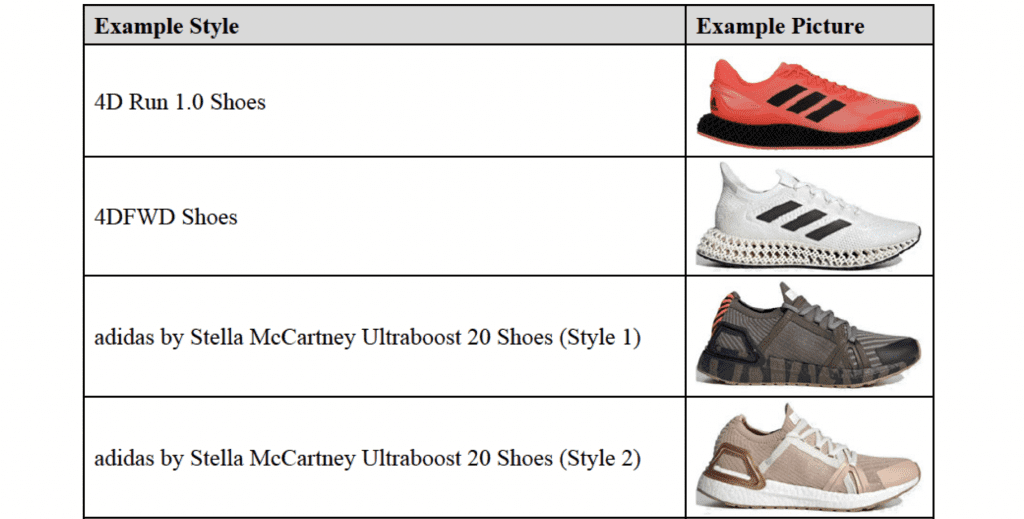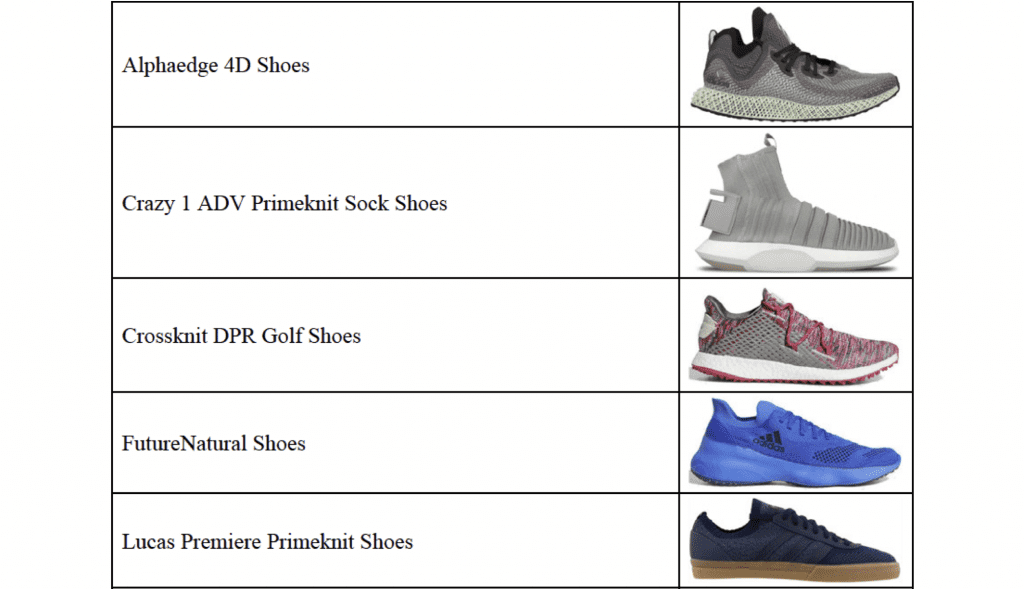An almost decade-long fight between Nike and adidas has spilled over into a proceeding before the International Trade Commission (“ITC”), with Nike asking the federal trade body to block the import of adidas’ Primeknit footwear on the basis that the sneaker tech infringes a number of its utility patents. In the complaint that it filed with the ITC on Wednesday, Nike alleges that adidas is violating Section 337 of the Tariff Act of 1930 by importing sneakers that infringe upon its rights in the “game-changing” Flyknit tech and the “novel method of designing and manufacturing uppers that enables Nike to create footwear that excels in performance, design, and aesthetics, while reducing materials and waste.”
Setting the stage in its complaint, Nike asserts that it is in the business of “investing heavily in research, design, and development” in order to create novel “technologies and products that enhance athletic performance, reduce injury, and maximize comfort all while reducing waste.” Among such boundary-breaking developments is its Flyknit, which Nike says is “a culmination of more than a decade of research and development,” and the result of Nike spending a substantial (and redacted) sum of money.
Unlike itself, Nike claims that “adidas AG, adidas North America, Inc., and adidas America, Inc. (collectively, ‘Respondents’ or ‘adidas’) have forgone independent innovation,” and instead, have “spent much of the past decade challenging several of Nike’s patents directed to Flyknit technology.” Nike’s relevant patents in the ITC matter are 9,918,511; 9,743,705; 8,266,749; 7,814,598; 9,060,562; and 8,898,932, which generally relate to “specific aspects of knitted textile uppers;” “knitted uppers that have an integral tongue that is formed as part of the knitted upper;” and “an upper with a knitted component and a skin layer secured to the knitted component.”
Such challenges, Nike alleges, include “unsuccessful petitions at the U.S. Patent and Trademark Office’s Patent Trial and Appeal Board that targeted two of Nike’s patents at issue in this case,” and subsequent appeals to the U.S. Court of Appeals for the Federal Circuit and the Supreme Court, in which Nike claims that adidas also came up short.

All the while, as adidas was “unsuccessfully challenging” the Flyknit patents, the German sportswear giant “continued to use Nike’s patented technology without permission,” Nike claims. The result, according to the Beaverton, Oregon-based behemoth? “Today, adidas offers dozens of footwear products that infringing Nike’s patents,” including by way of its “many so-called Primekit shoes.”
With the foregoing in mind, Nike claims that it is “forced to bring this action to defend its investments in innovation and to protect its technology by halting adidas’ unauthorized use.” Specifically, Nike has requested that the ITC institute an investigation into adidas’ alleged violations of section 337 of the Tariff Act, namely, its “unlawful and unauthorized importation into the U.S.” and subsequent sale of “certain knitted footwear products that infringe Nike’s patents protecting its Flyknit technology.” Nike is also seeking a limited exclusion order and cease and desist orders against adidas in connection with certain footwear products that allegedly infringe the aforementioned patents.
Section 377 provides for the investigation of unfair acts in connection with the importation of articles into the U.S., with the primary remedy for violations being an exclusion order that prevents the goods at issue from entering in the U.S. The Washington, DC-based ITC’s power to grant broad exclusion orders, which serve as a powerful remedy to prohibit the entry into the U.S. of infringing articles, has made it an increasingly popular forum to handle intellectual property disputes for both U.S. companies and foreign companies with a U.S. presence.

Beyond that, the “uniquely fast and compressed nature of an ITC Section 337 investigation” makes it an attractive forum for companies to enforce their rights, per Squire Patton Boggs attorneys Adam Hess and David Prueter. “Unlike district court litigation, which can take several years to reach a trial date, a case filed before the ITC can proceed to an evidentiary hearing before an administrative law judge in eight to nine months.”
The ITC complaint is part of a larger fight that has pitted Nike against adidas over the two companies’ respective knitted footwear, a long-running clash got its start in the immediate wake of the London Olympics in 2012. Leading up to the Olympics, Nike and adidas released their first knitted running shoes: Nike announced the debut of its Flyknit shoe in February 2012, while adidas unveiled its knitted footwear the following July, hailing the product as “a first-of-its-kind running shoe.”
The clash has taken the form of a Nike-initiated lawsuit in adidas’ native Germany, as well as an array of inter partes reviews (i.e., proceeding to invalidate already-issued patents) before the Patent Trial and Appeal Board and challenges before the U.S. Court of Appeals for the Federal Circuit. Nike has argued throughout the respective rounds of the knit-centric battle that it “has a strong heritage of innovation and leadership in footwear design and development,” and that its patents are “the foundation of that leadership, and we protect them vigorously.” Meanwhile, adidas has consistently and “vigorously” denied allegations of patent infringement, asserting that its Primeknit technology is the direct result of “years of dedicated research.”
The case is In the Matter of CERTAIN KNITTED FOOTWEAR, 337-3580, U.S. International Trade Commission.











